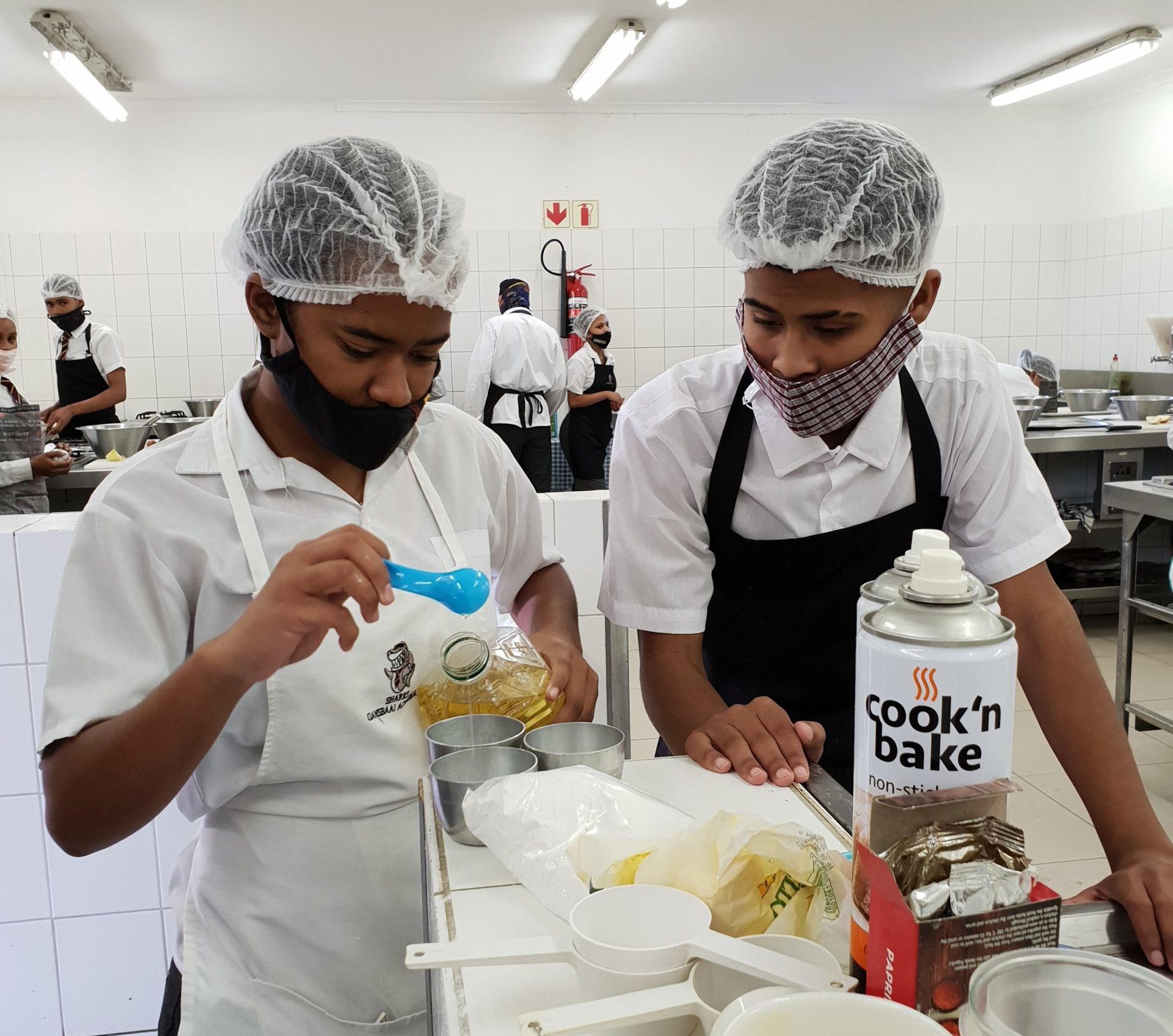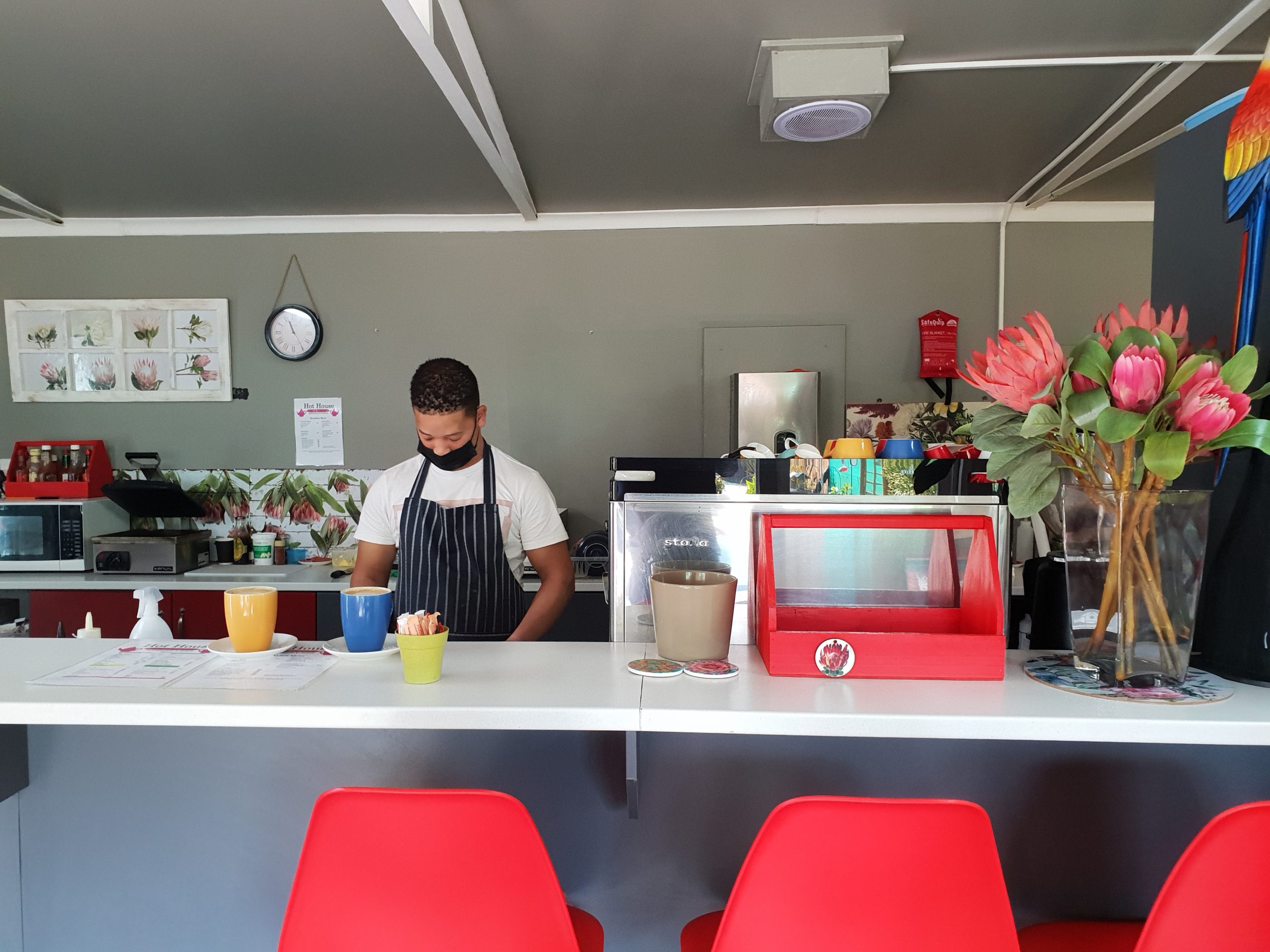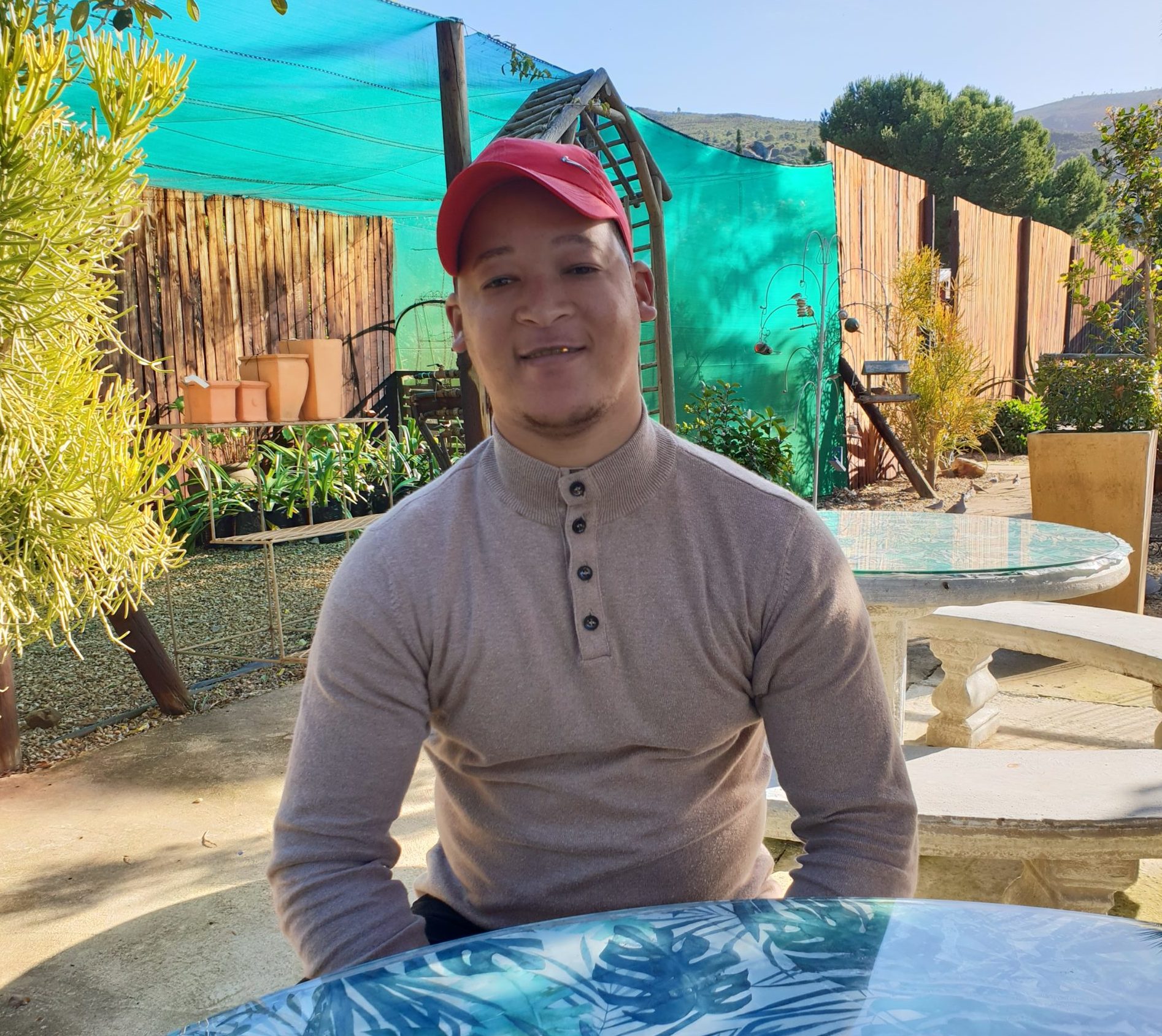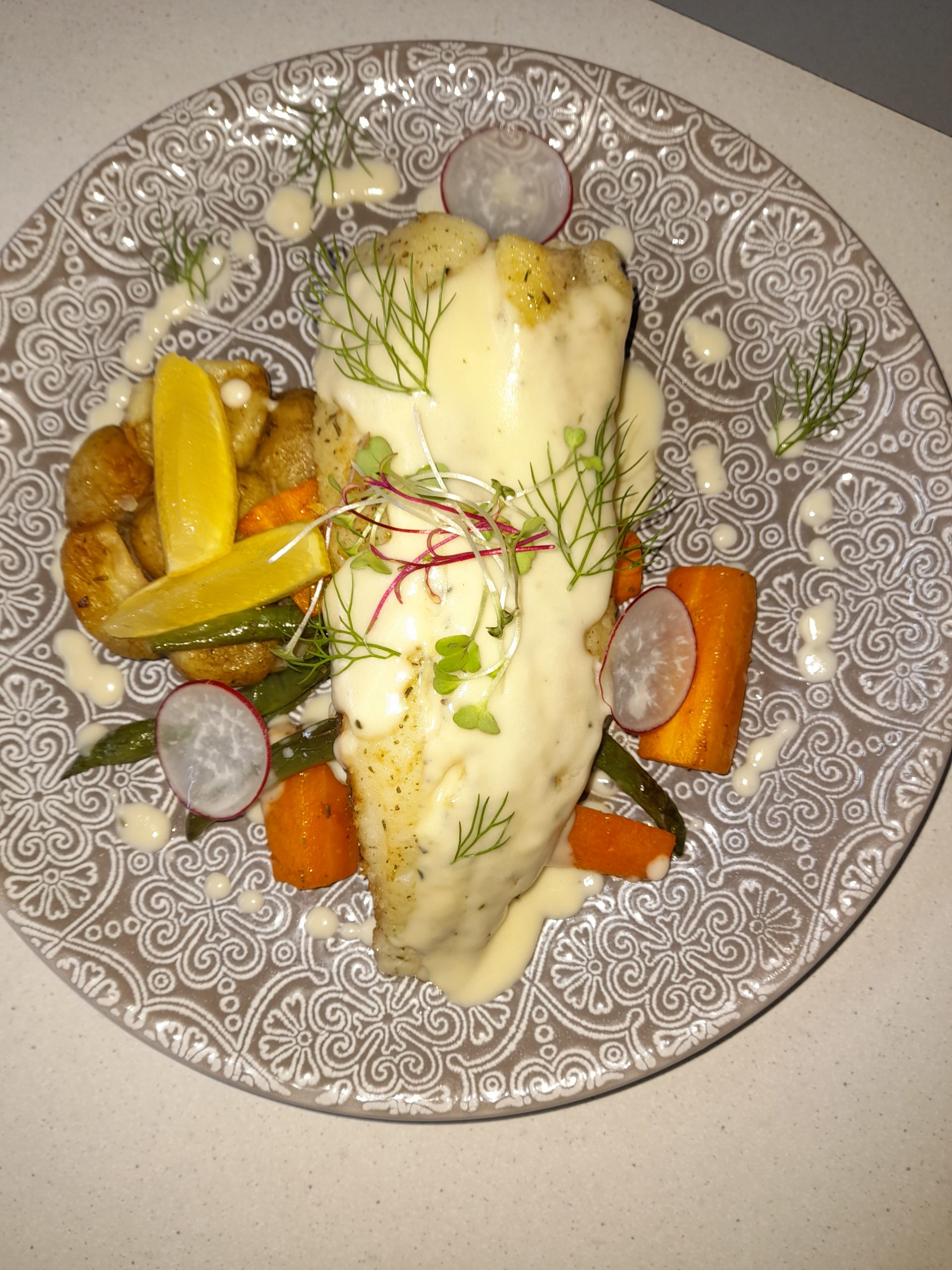Maverick Life
Gansbaai Academia: The school that enables dreams

There is something in the culture of Gansbaai Academia – and in the relationships between teachers and learners – that is beautifully enabling.
In 2018 I visited Gansbaai Academia for the first time. It’s the only high school in Gansbaai, a town in the Overberg known more for seasonal whale watching and great white shark sightings than for the quality of its schooling. I wrote a chapter about the school in Where Light Shines Through: Tales of Can-Do Teachers in No-Fee Public Schools which was published last year. But there is something about the story of this school that has stayed with me.
“Learner centred” is a numb phrase often cited by officials and academics, but this school infuses it with meaning. There is something in the culture of the school – and in the relationships between teachers and learners – that is beautifully enabling. I have returned to the school to find out more.
Hanet van Deventer is the hospitality studies teacher. She and her family moved to Gansbaai from Pretoria for a change of gear from big city living. She has been with the school since 2010, the year it opened its doors.
She has a busy day ahead of her when I visit. This is a dual-medium school and today she has asked her Grade 11 Afrikaans class to come in for three back-to-back practicals to make up for the lost time and disruptions of Covid-19 scheduling.
Eighteen Grade 11s organise themselves into pairs. Each workstation includes a gas hob, a sink and a stainless steel counter with pots and pans and other essentials. They wear a colourful assortment of home aprons over school uniforms, white chef caps over their hair. There’s a lot to get done, and a clatter of preparation.
Was hande, maak vensters oop, deur oop!
Covid protocols need to be observed. Van Deventer’s voice rings through. It’s a teacher’s voice, and even more amplified, because it’s also the voice of a head chef in a busy student kitchen.
“Where’re your aprons?” she asks three boys.
“Forgot, Juffrou.”
She sighs but goes to a little room in the back to get for them.
The first recipe is tuna quiche. Another clatter of bowls and implements from under the counters.
“Get all your ingredients in front of you before you start. Check against the recipe. You need 30ml cream. Look at your measuring cups. Remember it could be two 15ml cups, or one 25ml cup and one 5ml cup. Either way, it’s still 30ml.”

Gaillyn Dickson and Frankwyn Maggot measure out their quiche ingredients. Image: Supplied
While the class busies themselves measuring, van Deventer grates the cheese and allocates a portion to each pair. There is no school budget for ingredients. Each student has to pay R30 for every recipe. Her shopping list is carefully curated, and there is nothing to spare. There is flour scattered around the measuring table, a little on the floor, floury hands are wiped onto the seats of trousers. There is some jostling and giggling, an air of general excitement.
“Has everyone checked the ingredients?”
“Ja, Juffrou.”
“Do you have two eggs?”
“Ja, Juffrou.”
“80ml milk?”
“Ja, Juffrou.”
She strides through the space lighting the gas hobs. As blue flames pop into life she shouts out the instructions.
“Remember, we are sautéing the onions. Does everyone remember what it means to sauté? Make sure your pan is not too hot. If it feels too hot, lift it from the flame.”
The sound and smell of frying onions fills the room, transforming it into a working kitchen. A girl swishes her onions around in the pan with a fork. Van Deventer gives the raised eyebrow and hands her a wooden spoon without a word.
“Don’t chop on a tray,” she tells another, “you only ever chop on a board.”
These basics have been taught in earlier grades. There are lessons dedicated to kitchen tools and safety. In the same way that a maths teacher would reinforce the basics, she reminds them.
There are running taps and dishes clatter as the muffin trays are packed into the oven; the first round of washing-up starts and they start preparing the ingredients for the second practical.
A few weeks later I visited Eswin Kapot, a Gansbaai Academia alumni. He is the manager and chef at the Hot House coffee shop in the grounds of the Walker Bay Nursery in Hermanus. The space is tastefully decorated and spotless.
“That’s something I will always remember from Hanet’s class,” he tells me. “Clean up as you go! Now I always clean up as I go.”

Eswin Kapot at the Hot House coffee shop. Image: Supplied

Eswin Kapot is a Gansbaai Academia alum. Image: Supplied
Oversized acrylic portraits by a local artist dominate the walls. Bright floral cushions and crocheted teddy bears on the couch. A vase of proteas that have opened into their generous red. Sun streams through the doors at breakfast time and the chatter of birds from the feeders outside mingles with the sounds of Lionel Richie on the coffee-shop playlist. Herbs grow in terracotta pots among the courtyard tables where most customers are served their meals.
Kapot grew up in nearby Stanford with his mother and siblings. His father died when he was young, and he carried the responsibility of being the eldest child from a young age. He talks fondly of his time at Gansbaai Academia, and particularly about the teachers who believed in him.
He tells of the rugby coach, Wynand Bezuidenhout, who told him that if he dropped business studies he would be dropped from the team. He remembers the previous principal, Tommy Wilson, who was on the side of the field supporting every rugby match he played. “He did a fantastic job as principal,” he says.
He tells me of his English teacher, Mervyn Hess – another founder of the school and lifelong Gansbaai resident – who stood by his family in their darkest times. He remembers Wilton Phillips encouraging him to remain in the top 10 in the class when he achieved that position in his second term in Grade 9. He particularly remembers his words: “I expect it of you.”
He was always the last to leave the kitchen during hospitality studies, often helping van Deventer with the final tidy-up and packing away. He remembers a conversation in one of these quiet moments when she told him that he had what it takes to become a chef. She told him hospitality studies was something he could build a dream on.
Kapot also made quiche for his Grade 11 practical in 2015. That same week he served it to his family and his mother asked him to take over the responsibility for family meals.
While the quiches made by this year’s Grade 11s are browning in the oven, the learners clean up before measuring out the ingredients for roly-polies, a confectionery made with apricot jam and an orange juice reduction.
“I dished out 18 oranges, and we are one short,” van Deventer shouts out. “One has gone missing,” she says to make it clear.
“One has been stolen. Do you know what happens to you if you steal in the workplace?”
“You get fired, Juffrou.”
“Yes, you get fired.”
She lets it go and carries on. Some are still trying to get the quiche mixture finished, others have started mixing dough, others are grating oranges, others are cleaning up. There is a crescendo of noise and a sense of general mayhem threatens to envelop the room.
“Everyone STOP.”
She’s a statue in the midst of the space. Hands raised. Glasses pushed onto her head. Her mask slipping towards her chin. There is a deflation as the impending chaos dissipates.
“Everyone. Put everything down. Stop what you are doing. And LISTEN. Now we are going to make roly-polies.”

Hanet van Deventer helps Belnay Gabriels prepare the roly poly base before rolling it. Image: Supplied
She takes them through the recipe, step by step. Everyone listens. After break they move on to the final practical. Chicken cordon bleu. By the end of the day, each child has prepared a three-course meal and written exercises as the theory component.
Chicken cordon bleu features sometimes on the menu at Hot House. Kapot serves it with mash and balsamic glazed green beans with almond flakes. He aspires to offer more than what would be expected at a nursery coffee-shop.
“I like to give people what they like, what they’re used to, but with a twist to it. I like to spice it up with something that makes it more wow!”
There is a standard menu, and then the weekly special, the pensioner’s Wednesday special and Pan Friday. Last week he offered pan-fried hake served with garlic herb roasted baby potatoes, grilled veg and a creamy white wine sauce. For a birthday party booking next week he is planning pork belly wrapped in cumin and smoked paprika to give it that wow factor. He’ll serve it with nutmeg mash, roasted veg and a red wine jus.
I visit Hot House on a busy Sunday morning. Kapot guides an elderly couple down the path towards their table in the sun as they easily pick up the threads of last Sunday’s conversation. The little girls at a family table thank him by name as he delivers their chocolate milkshakes.
“Daarsy! Gesondheit!”
He loves the cooking, the customers, the vibe and it shows.
“In this industry, you have to love what you do. You can’t just come in and do your job every day for the salary. It’s a job I wouldn’t trade for anything else, because I love it.”

Eswin Kapot. Image: Supplied

Pan fried hake served with garlic herb roasted baby potatoes, grilled veg and a creamy white wine sauce. Image: Supplied
Back in Gansbaai, van Deventer has supervised 18 chefs making three dishes consecutively. There is time pressure. There is no budget for a cleaner, and the chefs have to clean the kitchen between courses and again at the end of the day. She has to track and monitor each child’s progress and prepare and mark the theory component for each recipe. She still has to shop for the ingredients for the matric practicals tomorrow.
“I’m very tired at the end of the day,” she tells me later. “It’s a lot of work. People don’t know what it takes. But I love it. This is what I want to be doing.”
It’s the kids she loves more than anything, I suspect, and following their progress through their Facebook posts and correspondence. I ask Kapot about that dream that he and van Deventer spoke about in the Gansbaai Academia kitchen. He thinks for a long time before answering, looking towards the Cape weavers and European starlings still fluttering around the feeders.
“One day I would like to put a stamp on my own restaurant with my own logo. But what I’m aiming to do now is to put my name out there, to maybe get to work under another chef as an apprentice.”
Gansbaai Academia is making a name for itself as a school leading the way in piloting a number of vocational streams in the high school curriculum. Besides hospitality studies, it offers tourism and marine studies. Coding and robotics are offered as an extramural but there are plans to formalise it as a subject.
A matric with hospitality studies helped Kapot find work in restaurants immediately after school while he enrolled in courses with a chef’s school in Hermanus. He carries a weight of responsibility for one so young. He is the primary breadwinner in his family while starting a new family of his own. When I visited his fiancée, Theona, was helping to serve tables while their little boy, Tershwin, played behind the counter.
While there is a case to be made for more schools developing vocational training streams, there is something else remarkable happening at this school, something not so easy to put a finger on. There are many teachers who believed in Kapot, who helped him imagine a greater possible self even as a series of tragedies befell his family, even as youth unemployment was on the rise. A culture of care is woven into the workings of the school and is a testament to the truth in a well-worn homily: Love truly makes the world go round. DM/ML

Kimon Phitidis. Image: Reney Warrington
Kimon Phitidis is a director of Social Innovations, a social investment agency, and author of Where Light Shines Through: Tales of Can-Do Teachers in South Africa’s No-Fee Public Schools.


















 Become an Insider
Become an Insider
It’s so refreshing to read good news stories every once in a while. And wonderful to read about a school that is offering kids practical vocational training that can actually lead to employment and fulfilling lives. I understand why there has been a focus on academic learning, but is it time to ask ourselves if we want to keep producing high school and university graduates with no hope of finding work – not to mention a dropout rate of over 50 percent, and then wonder how to solve the mass unemployment issue we have now? How can we destigmatise careers in trades and crafts and vocational training and trade apprenticeships?